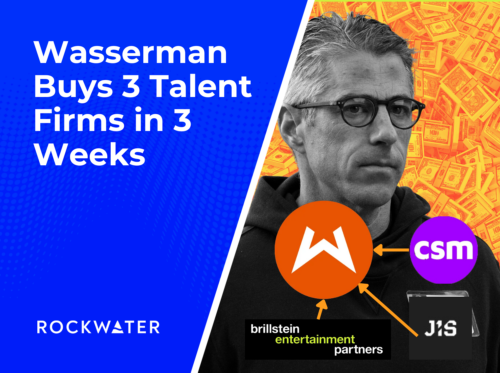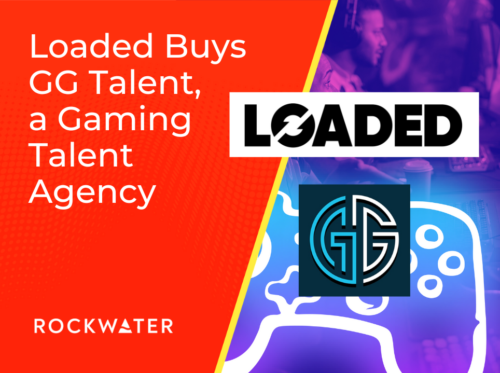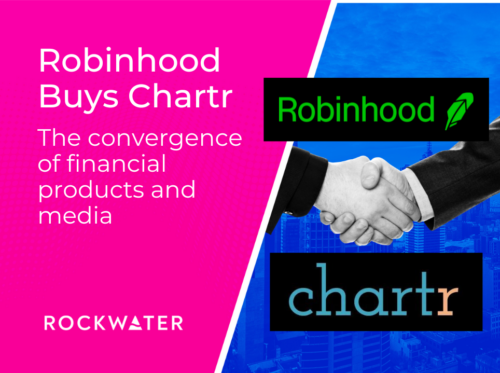Whalar Buys Sixteenth, its 2nd Talent Co Acquisition
RockWater Roundup
RockWater analysis to make you a better investor and operator. Today we discuss Whalar’s acquisition of Sixteenth, including the deal value prop, integration plan, and the increasing consolidation of talent management companies.
————
Whalar bought Sixteenth to scale its influencer mgmt biz.
The combined talent co will boast 44 managers and 300 talent.
Let’s break it down…
💰SELLER: Sixteenth
- Influencer management company
- Founded 2017 by Danny Lowney
- Based in the UK
- Mission to help creators extend past their “15 minutes of fame”
- Vertical focus spans beauty, education, fitness, finance to food, parenting, pet, sports, gaming
- Founder Danny started building online businesses when he was 19, which is when he first formed partnerships with creators
💸BUYER: Whalar Group
- Global creator-focused agency and media company
- “Helps creators, brands, and platforms work better together”
- Founded 2016 by Neil Waller and James Street
- Started as IM company after winning entrepreneurship contest
- Clients include Amazon, Estée Lauder, Google, PetSmart, Spotify, S.C. Johnson,
- 300+ employees across Berlin, Chicago, London, LA, Malaga, NY, Tallinn
- May 2022 acquired disabled-led talent mgmt and consultancy, C Talent
- Raised $5M funding between 2016 to 2017
- Has 6 divisions under Whalar umbrella
6 Whalar Divisions
- Brand partnerships (creative, content creation, IM, data/analytics, consulting)
- Physical campus for creators, opening 2024 (Lighthouse)
- Operating system for digital talent (Foam)
- Creator brand incubator (Moby Ventures)
- Talent management (Sixteenth)
- Gaming studio
🤝DEAL DETAILS
- Announced 10.10.24
- No deal details were disclosed
- Previous history of working together pre deal
🔎DEAL ORIGIN
- In 2023 Sixteenth founder Danny founded Spark Jam
- A platform combating Creator burnout by fostering community
- Venture led to a partnership with Whalar Group, resulting in Sixteenth’s acquisition
💎DEAL VALUE PROP
- Combine Whalar’s talent arm with Sixteenth
- Get more scale in 360 mgmt company
- Enable creators to work with world-leading brands and grow audience
- Access to more creators for Whalar’s brand partnerships business
- Increase focus on creator-led entrepreneurship and businesses
- Creators get access to career development, community engagement, educational tools, and data-driven insights
- Access to more creators to package opps for talent buyers, from brands to studios to streaming platforms
🤝POST DEAL OPS
- Combined talent firm will operate under Sixteenth name
- Merged talent firm will boast 44 managers and 300 creators across US and EMEA
- Will be led by Whaler Talent President Victoria Bachan
- Bachan will continue to report to Whalar Group Co-CEO and cofounder James Street
- Bachan’s exec team at Sixteenth will include COO Fan Jozsa, U.S. Director of Talent Amron Lopez, and U.K. Director of Talent Kiera Pérez
- Sixteenth founder Danny Lowney will help with integration, then transition to advisor role to develop “a new offering within Sixteenth”
🧐WHAT ELSE I FIND INTERESTING & DEAL INSIGHTS
There’s been lots of consolidation and capital flows into digital and influencer-focused marketing agencies and platforms. From Publicis buying Influential for $500M to Stagwell buying Leaders, with both deals announced in July 2024. This dealmaking activity builds upon much more M&A this year, and back to 2022.
I discuss more of these marketing and talent agency deals on our blog.
There’s also been many capital flows into talent representation companies, with talent agencies in particular commanding the most investor and acquirer interest.
Marquee talent agency deals since 2022 include:
- Jul 2022 EQT invested in UTA
- Jun 2022 CAA acquires ICM from Crestview for $750M
- Nov 2022 Providence bought 30-40% of Wasserman, which led to an M&A spree of 15+ deals in the past few years
- May 2023 Crestview bought 45% stake in Gersh
- Sep 2023 Artemis bought a majority stake in CAA from TPG
- Jan 2024 Gersh bought A3’s digital and alternative teams
- Apr 2024 Silver Lake took Endeavor private for $13B
But now there’s another trend emerging.
There’s an increasing amount of consolidation amongst talent and influencer management companies. Here are some recent capital flows in the space…
- Aug 2023 Night Acquires LFM Management
- Sep 2023 Wasserman acquires Brillstein
- Nov 2023 2 Social and Ensemble Digital Studios merge to create The Creator Society
- Mar 2024 Loaded Buys GG Talent, a Gaming Talent Agency
- Apr 2024 Liberty, Wildcat Invest in Range Media Partners
- Jun 2024 TPG Bought Untitled, Plans new Talent Co
- Jul 20224 IZEA-Owned Hoozu Buys 26 Talent, Expands in APAC
- Sep 2024 Wasserman Buys Long Haul Management
Based on this deal activity, my observation is that there’s been more deal volume, in terms of total # of deals, for influencer management companies. In contrast, I believe the total deal volume by total aggregate enterprise value, is higher for traditional management companies, like TPG’s acquisition of Untitled and Wasserman’s acquisition of Brillstein.
This is unsurprising, as these traditional management companies have typically been around for multiple decades and are more established than many of the digital-native management companies. They have large traditional talent rosters, and diversified and scaled revenue from film/TV, streaming, touring, endorsements, book publishing, merch, and more.
Interestingly, many of these traditional management companies are still independent, and the landscape is very fragmented vs the traditional Hollywood agency landscape…I think of companies like Entertainment 360 (fka Management 360), Anonymous Content (minority stake owned by Emerson Collective), The Gotham Group, Authentic Talent, and more. (3arts is owned by Lionsgate, though a spinoff could be possible).
In contrast, the digital-native management firms, are a newer vintage and at the oldest have been around for around a decade, and the majority of their revenue is from brand partnerships.
But similar to the traditional management companies, the influencer management company landscape is also highly fragmented. The majority of independents remaining are subscale with about 1-4 employees and doing 6 figures in net revenue. That being said, there are still a few scaled and independent firms left.
Of note, the top-performing digital-native representation firms are growing very quickly, and there’s a lot of headroom to grow into considering the broader trend that audiences are spending the majority of their time in digital environments, and revenue flows to where audiences spend their time. Further, that influencers and creators are the modern business builders, and are rapidly diversifying their businesses beyond just brand partnerships.
The main takeaway here, is that the talent management landscape seems primed for a rollup, and we should expect to see more deal activity going forward. These are the core deal drivers:
- Traditional and digital management landscape is highly fragmented
- There are many synergies in combination (the intro of my article here captures most of the rationale)
- Historical precedent in PE investing in talent rep business models and earning good investor ROI
- Increasing deal activity in traditional and digital management businesses over last 12 months
Lmk if there’s any relevant deal activity that I may have missed here.
Alright, I wrote a lot more on the above point than I was expecting, so I’ll keep the next two points brief.
Should we expect more M&A from Whalar?…
Yes. Whalar is operating in a consolidating landscape where scale and diversity of services for its creator and brand marketer clients will be the key determinant of success. And the market will be winner-take-most.
Whalar raised $5M back in 2016/2017, so the company will have to use its balance sheet for continued dealmaking. This may cause them to be less aggressive than their PE-backed agency peers who have access to large capital warchests…or alternatively, Whalar can get creative in structuring deals with smaller M&A targets who are excited by Whalar’s vision, and who are ok with deferring the need for lots of cash consideration upfront in exchange for a potential large liquidity event by the parent co in the near to medium term, which sellers can participate in via rolled equity or equity in the Whalar parent co.
I also wouldn’t be surprised if Whalar is in talks with investors to provide capital for more rapid expansion. Or if Whalar is positioning itself for a sale in the near to immediate term to a larger strategic partner.
Reminder, this is just my speculation based on market trends and advisory experience!
A final note on agents VS managers…
This is worth touching on briefly.
Digital management companies operate more like management company and agency hybrids, where they both procure deal opportunities, and also oversee the 360 build-out of talent businesses.
This is in stark contrast to traditional Hollywood representation firms, where managers and agents mostly stay in their operating lanes where agents procure deals and can “package” deals for talent buyers, and managers oversee and guide the talent’s career and can be producers. The traditional division of duties is due to required licenses, liability risk for crossing lines, reputation and partner management, and historical operating and legal precedent…but all that being said, that line has always been a bit murky.
Case in point, see the recent CAA lawsuit against Range Media, where the agent vs manager point may be litigated yet again, unless the lawsuit gets settled in advance (which is likely, thanks to some deep pockets by Range’s investors).
The blurring of the lines hasn’t been an issue for digital management companies historically. But I do believe that will change as (1) the digital business gets bigger and (2) more sophisticated investors enter the space.
When there’s more money at stake, lawsuits and scrutiny followes. Will be worth watching
Alright, time to run to a dinner. See you next week.
––––––––
I’m the founder of RockWater Industries. We do financial and strategy advisory for media, agencies, and creator economy. From M&A and fundraising to consumer research and go-to-market planning.
DM me on LinkedIn or email me chris @ wearerockwater dot com



